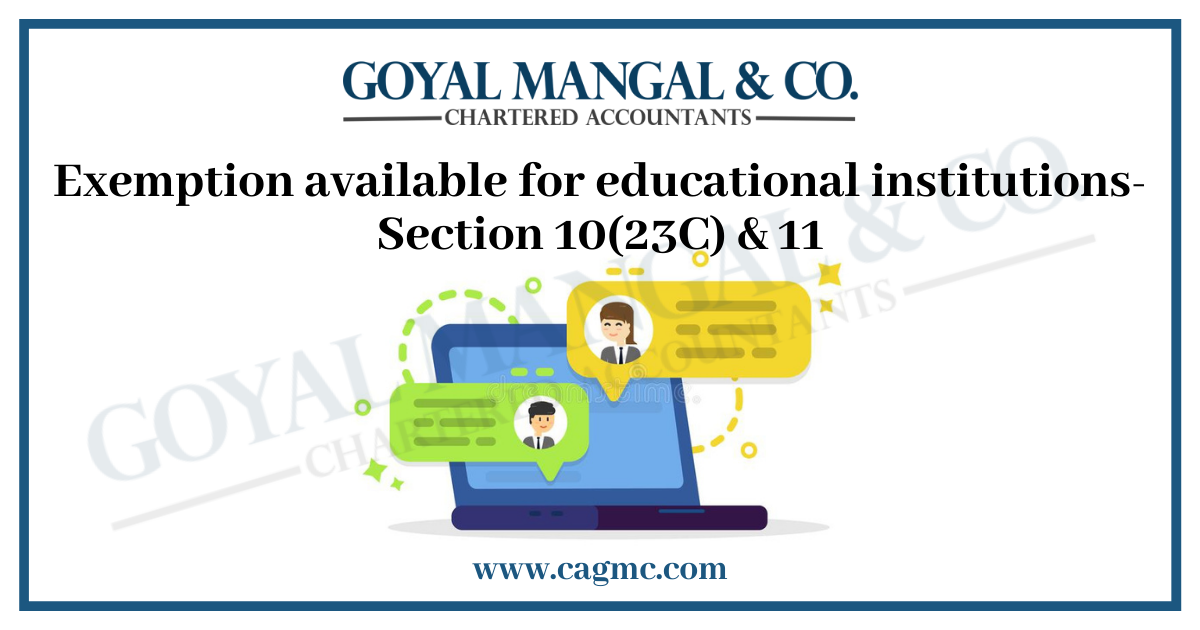
Charitable institutions registered under section 12AA of the Act may seek exemption under section 11 of the Act once conditions have been met. Section 11 is a general provision and applies to all institutions which are charitable while Section 10 (23C) is a specific exemption provision relevant to certain public and private educational institutions. This article highlights the exemption available for educational institutions- Section 10(23C) & 11.
|
Table of Contents- |
Educational institutions under Section 10 (23C)
Educational institutions that fall under the provisions of Section 10 (23C) are as follows-

Government Institution for Education
- The educational institutions of first-class dealt with Income Tax is funded by the Government.
- The revenue received by any university or educational institution that comes for educational purposes only and is subsidized by the Government is fully exempted from tax under Section 10 (23C) (iiiab).
iii) No separate permits are required for Government institutions.
Educational institutions with full receipt>Rs. 1 Crore (Now up to 5 Crore)
- The effective provision of these institutions in Section 10 (23C) (vi).
- Revenue received by any university or educational institution that exists solely for educational purposes and not for profit, other than that referred to in clause (iiiab) or clause (iiiad), will be released if authorized by the prescribed authority.
Thus when Total Receipts exceeds Rs. 5 million, the institution requires separate approval from the designated authorities.
- For this purpose an educational institution must apply for Form No. 56D as prescribed in Act 2CA and supporting documents before the Commissioner for Income Tax (Exemptions). As approved by / s 12AA, authorization for s / s 10 (23C) is also available permanently unless the authority is revoked.
- There are certain conditions for exemption from / s 10 (23C) (vi) – (Section 3 of Section 10 (23C)
How to seek exemption?
For this purpose, an educational institution must apply on Form No.56D as set out in Rule 2CA. An application may be made at any time (and not before the end of the financial year), but must be made on or before 30 September or during the relevant inspection year for which the release is required. The designated officer may request any documents (including audited annual accounts) or information to ensure the integrity of the functions as may be deemed appropriate. He or she may also ask such questions as he or she sees fit. The designated officer must issue an order granting or refusing approval within 12 months from the end of the month in which the application was received. Once a permit has been issued, it is not necessary to seek the annual renewal of the permit. It will be valid until revoked.
Income accumulation as per Section 10 [23C (VI)]
The inspector can only collect 15% of the proceeds of future operations and if there is an excess it should be included in that item within five years. If the accumulation is less than fifteen percent of the annual revenue received by these institutions, there is no limit to the accumulation period. The revenue collected is required to be invested in securities as defined in Section 11 (5) only. Because there is an increase in revenue and expenditure accounts, the institution does not cease to be a non-profit organization. The only condition is that the residue should be used for educational purposes only and not for any other purpose.
Return of income
As per S.139 (4C) all educational institutions mentioned in clause (iiiab) or clause (iiiad) or clause (vi) of Section 10 (23C) the gross revenue that such institutions may inspect. , in addition to making the provisions of section 10, exceeds the maximum taxable income, providing a refund of that year’s income in the prescribed manner.
Audit
If the total income other than in terms of clause 10 (23C) exceeds the maximum taxable income in any previous year, the accounts must be audited by a qualified Accountant under S.288 (2) and must submit such report in Form 10BB with a refund of revenue for the relevant examination year.
Withdrawal of exemption
The Prescribed Authority is also authorized to withdraw the exemption granted to s / s 10 (23C). If the designated officer is satisfied that the educational institution has not only utilized and fully utilized it for educational purposes, or invested deposits in contravention of subsection (b) of the third principle, then the activities of educational institutions are not true or false made under all the conditions under which it is authorized, the designated officer may withdraw the permit, after giving a reasonable period of hearing. A copy of the order will be sent to the educational institution and the Inspecting Officer.
Final words
Section 10 (23C) (vi) and Section 11 apply to different areas. Although common in some respects they differ equally. Requirements such as reimbursement, audit, and compilation of features are available in both categories. An institution that satisfies the provisions of Section 11, 12, and 13 may also be eligible for exemptions under Section 10 (23C). Therefore, the exemption is subject to the satisfaction of each of those categories.
The tendency of Assessing officers to refuse the exemption under Section 11 for certain reasons even if the inspector authorized by the designated officer as per section 10 (23C) should receive the attention of the authorities. The Examining Officer may have reason to refuse a waiver of a certain amount of revenue, but to waive an exemption of 10 (23C) certain guidelines are set out, the following is mandatory. The authorities will do well to address both issues while passing the inspection instructions.


